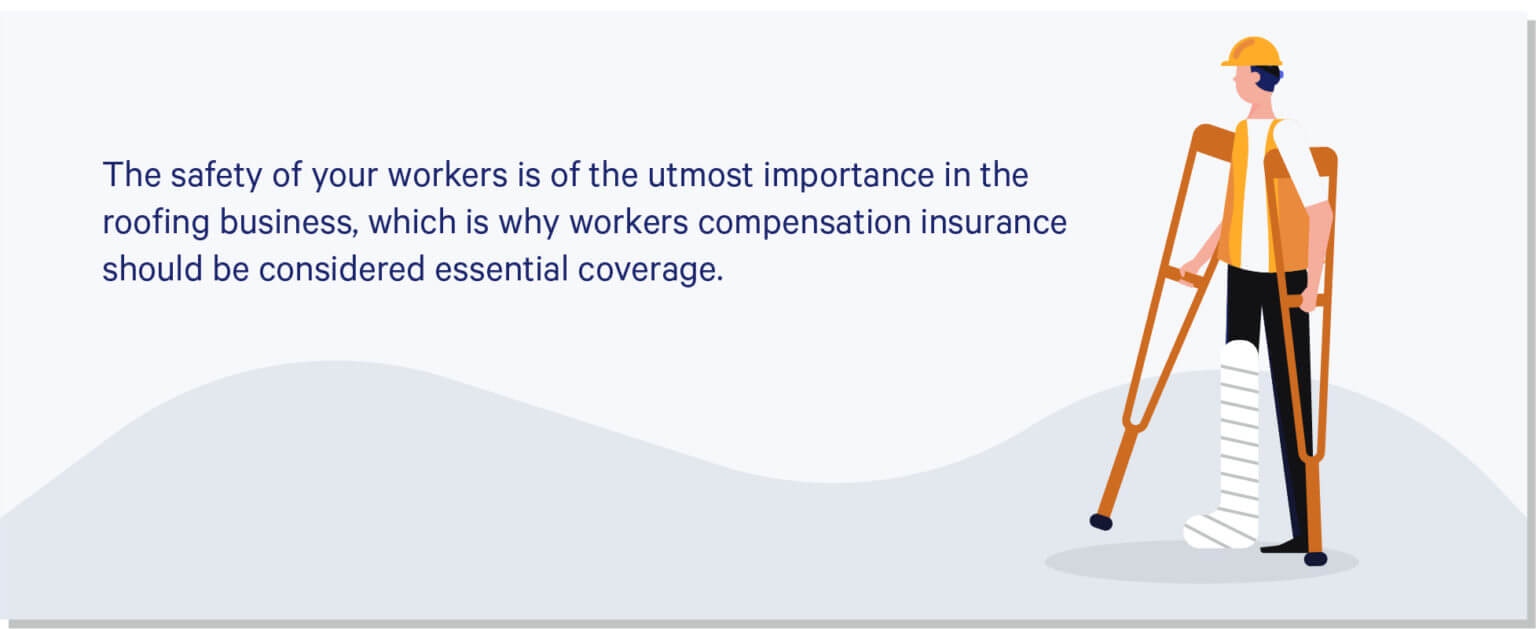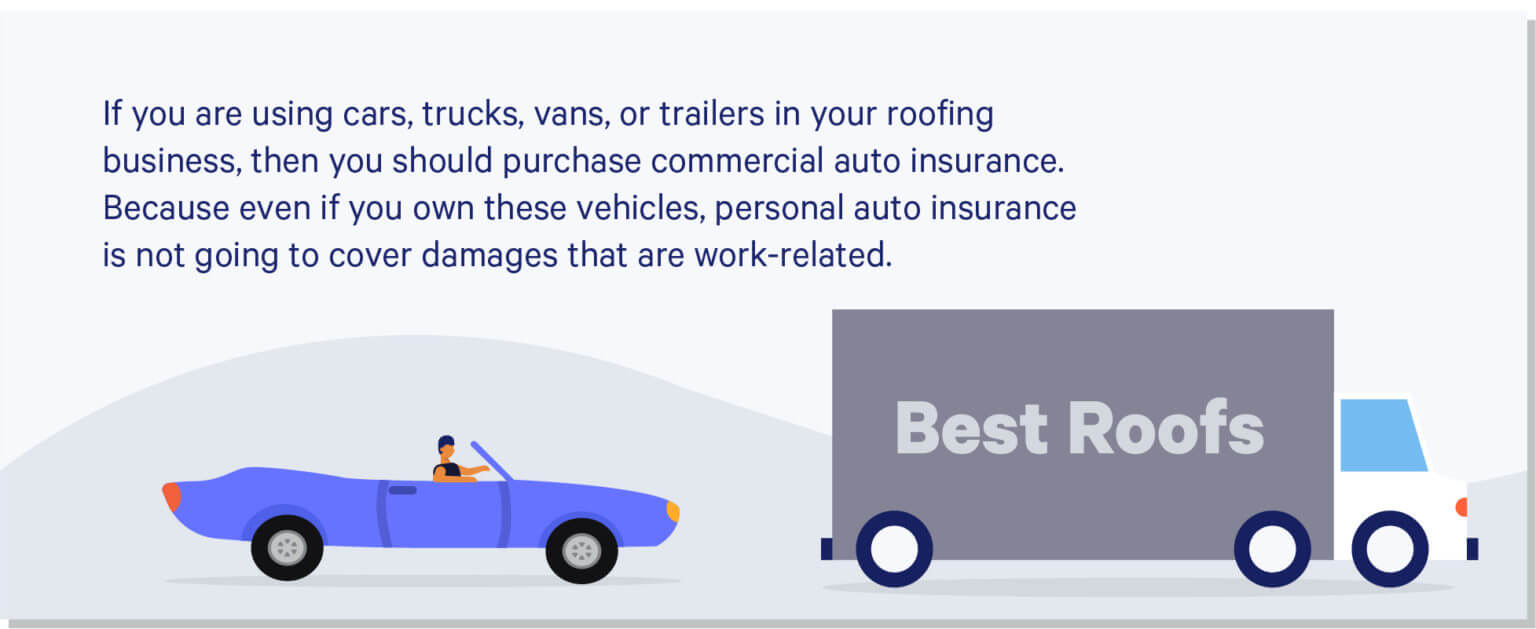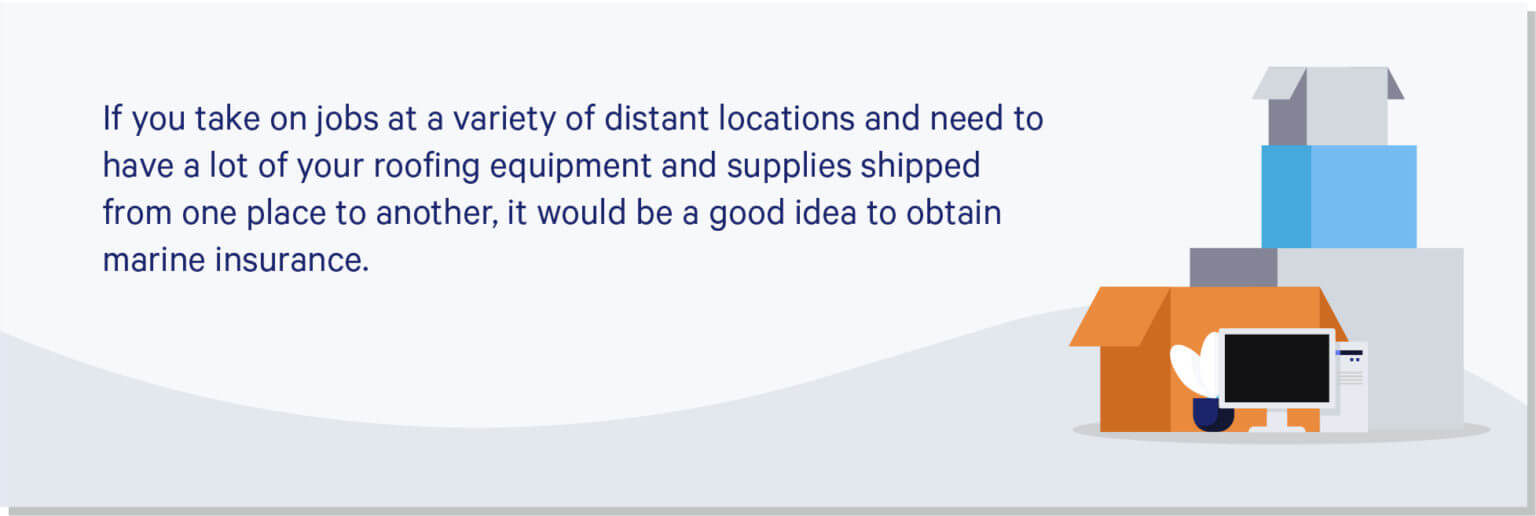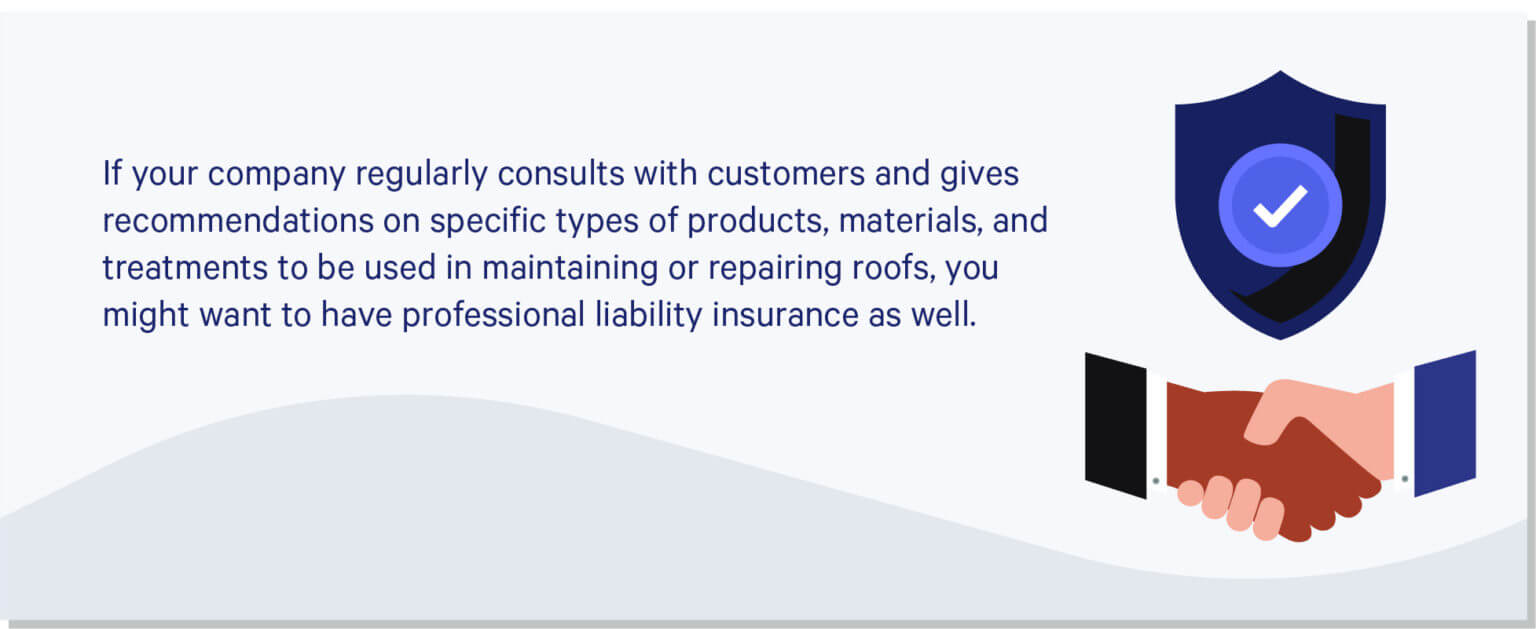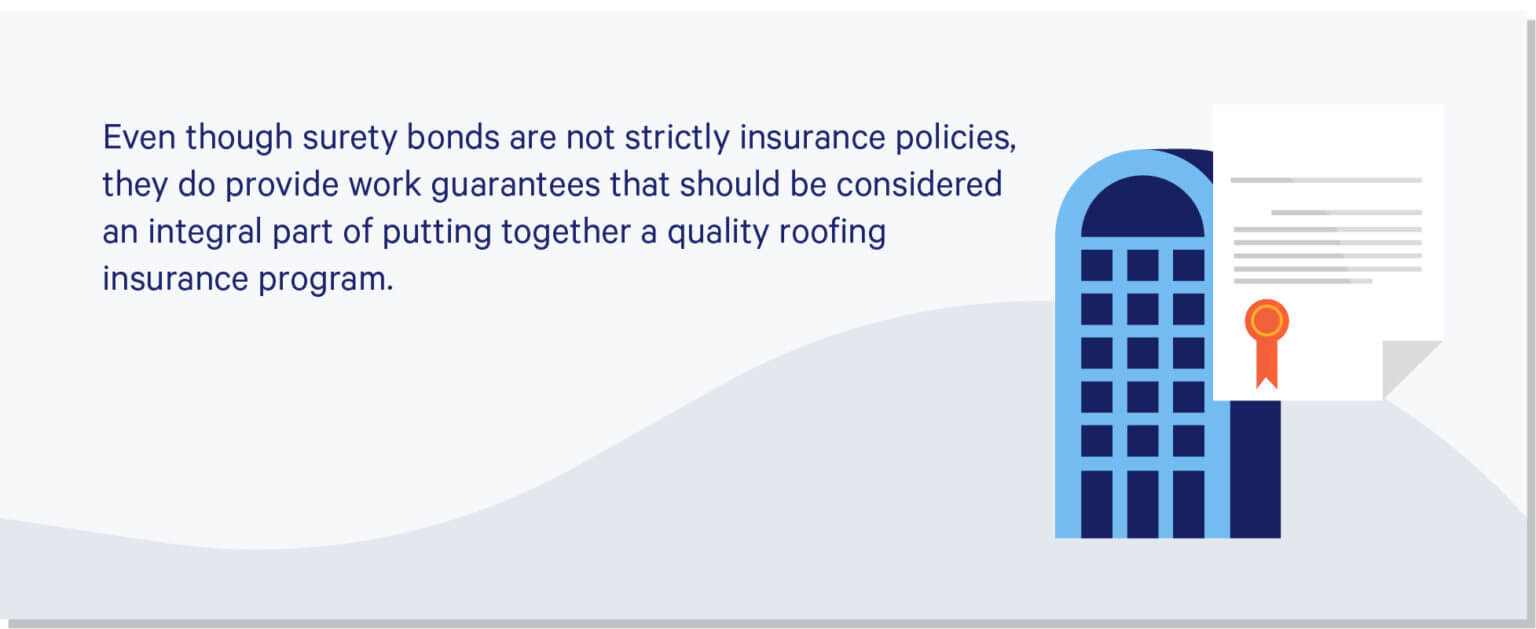What Insurance Policies Do Roofing Contractors Need?
Here's a detailed overview of the essential roofing insurance policies that effectively protect your contractors and business. Read more.
Protect your business today!
Get a QuoteIf you have a group of construction workers, working in high-risk situations you should consider roofing insurance policies. Working in construction is, without a doubt, one of the most high-risk professions in modern society, which is why insurance needs tend to be fairly complex in this line of work.
Roofing, specifically, is a very high-risk profession, considering the fact that roofers don’t have two feet on the ground when doing their jobs. The greatest risk associated with roofing is having a worker or associated contractor falls off the roof or a ladder and injure themselves.
According to the Bureau of Labor Statistics National Census of Fatal Occupation Injuries, roofing fatalities accounted for 96 of the 5,250 work-related fatal injuries in 2018. And while the average rate of fatal injuries per 100,000 full-time workers across all occupations is 3.5, the rate for roofers is 51.5, which is staggering.
And while the high rate of bodily injuries is the main reason why insuring your roofing business is absolutely necessary, there are also risks of property and equipment damage, among other things, that should be properly covered as well.
Let’s take a detailed look at what types of roofing insurance policies a typical roofing business should consider purchasing.
Business Owners Policy
A business owners policy (BOP) should be considered essential roofing insurance. While larger construction businesses will probably have to buy general liability, commercial property, and business interruption policies separately, smaller businesses (typically those that have less than 100 employees and generate less than $5 million in revenue per year) would be able to bundle these three coverages into a BOP and save money.
A general liability policy would protect roofers in the case of third-party bodily injury, meaning if someone who is not an employee working on the site is injured at the job site. For example, if one of your tools fell off the roof and injured someone who was walking by the job site, general liability insurance would help cover all costs associated with such an injury.
General liability also covers issues such as slander, libel, wrongful arrest, and other reputational rights of your business and yourself. It also covers claims made by customers related to services or products your business advertises.
Commercial property insurance will cover property and equipment damage. Whether you own or rent office buildings, storage facilities, or garages for your business, this insurance coverage will protect your property and the contents found within your property. Roofing professionals will often add a “tools and equipment floater” to their coverage in order to protect any specialized tools and equipment need for their business, whether purchased or rented.
Finally, the third coverage usually included in a BOP is business interruption or loss of income insurance, which reimburses businesses in the event that they must close down and aren’t able to work for whatever reason. It usually will cover loss of income and operating expenses for up to a year.
Workers Compensation Insurance
The safety of your workers is of the utmost importance in the roofing business, which is why workers compensation insurance should be considered essential coverage when putting together a roofing insurance program.
As we’ve already mentioned, roofing is a very dangerous job with a high fatality rate as well, which probably means that you’re going to have to pay a bit more for a good workers compensation policy than most other lower-risk businesses would have to pay.
If any of your workers are injured on the job, your workers compensation insurance will pay all of the medical bills, including rehabilitation needs. Workers compensation will also provide lost wages while your workers are recovering and unable to work.
In the event of a more tragic circumstance, workers compensation will also pay disability and even death benefits if a fatal injury occurs. It also protects you from workers compensation claims and will pay for defense costs and potential workers comp settlements in the event that your injured employee decides to take you to court instead of accepting the workers comp benefits you are providing for them.
Commercial Auto Insurance
If you are using cars, trucks, vans, or trailers in your roofing business, then you should purchase commercial auto insurance. Because even if you own these vehicles, personal auto insurance is not going to cover damages that are work-related.
Commercial auto insurance will cover damage to third-party vehicles and offers personal injury protection and medical payments for you and your employees if someone is injured while operating a work vehicle. It will also cover third-party bodily injuries if you or your workers are involved in an accident in which a third party is injured. You can get an instant commercial auto insurance quote in under 10 minutes with Embroker.
Most commercial auto policies also offer collision coverage, which covers all damages to your vehicle in the event of a collision with another vehicle and should provide gap coverage as well, which can cover the money you still owe on a leased vehicle if it is severely damaged and needs to be replaced.
Inland Marine Insurance
If your roofing business has most of its property and equipment at specific locations and you are mainly working in one area, then your BOP coverage should be enough. However, if you take on jobs at a variety of more distant locations and need to have a lot of your equipment and supplies shipped from one place to another, then it would be a good idea to purchase inland marine insurance as well.
Any business that needs to ship high-value equipment such as computers, servers, laptops, networking equipment, or large construction equipment on a regular basis should consider this coverage essential. Also, there are instances in which you can use inland marine insurance to protect someone else’s property that has been leased or loaned out to you and is in your possession temporarily.
Professional Liability Insurance
While this might not be considered essential roofing insurance, it is important for some types of roofing and construction companies. For example, if your roofing company regularly consults with customers and gives recommendations on specific types of products, materials, and treatments to be used in maintaining or repairing roofs, then you might want to have professional liability insurance as well.
This coverage protects you in the case of legal claims related to any advice or recommendations that you have given to a third party that directly resulted in some type of financial loss or damages.
Surety Bonds
Even though surety bonds are not strictly insurance policies, they do provide work guarantees that should be considered an integral part of putting together a quality roofing insurance program.
When people or government entities search for a roofing contractor, they want to find someone who is licensed, bonded, and insured, to make sure that they are dealing with a business that takes its work seriously in every phase. A surety bond is basically a legal contract put together between two parties that protects one party from financial loss in the event that the second party fails to perform the agreed task.
Getting bonded is quite a process for roofers. A business plan must be submitted that describes the purpose of the work to be performed. Financial assurances must be made as well, such as proof of availability of credit and other financial documents that show that the project is well funded and that the roofing company in question has a solid reputation within the industry and among contractors and subcontractors.
When it comes to securing bonds—whether you need bid, performance, payment, or any other type of bond—it’s always best to speak with a dedicated broker that deals specifically and expertly with construction and roofing businesses and understands the risks of the industry and the resulting needs for coverage.
Builders Risk Insurance
Builders risk insurance will protect a property at which a construction or renovation project is ongoing. The policy will provide coverage for buildings or other structures that are being built or renovated if they are vandalized or damaged by fire or weather. It will also cover equipment and materials used in the project, both on the job site and during transit.
Most owners will insist that the contractor in charge of the project secures this coverage and ensure that all subcontractors are also covered.
If you’d like to learn more about what type of insurance your roofing business needs in order to protect itself properly, reach out to one of our expert brokers at any time.
Articles may not reflect all coverages or Embroker insurance products. For more information and customized coverage for your business, please visit our business owner’s policy page.


